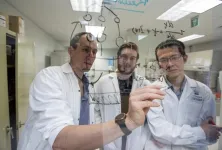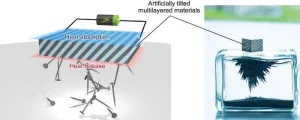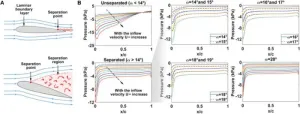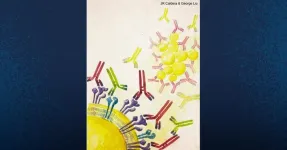(Press-News.org) New research led by the University of Oxford indicates that human domestication of crops can alter the communities of microorganisms that are associated with plants. Intriguingly, independent domestication events were found to have similar impacts on the plant microbiome. The results have been published today in Current Biology.
Lead researcher Dr Riccardo Soldan (Department of Biology, University of Oxford) said: 'Our study provides evidence that regardless of where and how domestication took place, domesticated plants have microbial communities that distinguish them from their wild counterparts. This knowledge is important because if we know that a certain domesticated crop species consistently associates with specific microbes, one day we might be able to engineer these communities to deliver positive effects to the host plant.'
As microorganisms can have numerous beneficial effects on host plants such as enhancing growth, stress tolerance, and drought or disease resistance, these findings could ultimately help inform microbe-based approaches to improve crop yields and food security. For instance, previous work by the research team suggests that domestication may have reduced the ability of crop plants to recruit microorganisms that enhance disease resistance.
In the new study, the researchers analysed the microbial communities associated with two crop species that are known to have been domesticated independently multiple times in Mesoamerica and South America: Phaseolus vulgaris (common bean) and Phaseolus lunatus (lima bean). This meant they had a series of replicates for an event that lasted thousands of years.
As the researchers wanted to understand whether any changes in the microbiome were linked to plant traits that were subject to selection by humans during domestication, they focused on microbes associated with seeds. In seed crops, such as beans, seeds have undergone significant changes during domestication. For example, domesticated bean seeds are significantly larger compared with their wild relatives and have different mineral contents (linked to improved seed quality and cooking properties).
Using statistical and machine learning approaches, the researchers found significant differences in the composition of the microbial communities associated with beans from the wild and domesticated plants.
Furthermore, these changes in microbiome abundance and composition correlated with changes in seed mineral content across multiple domestication events. In particular, reduced calcium concentrations in domesticated P. vulgaris seeds, which may have been selected for as a consequence of selection for improved cooking properties, showed a notable correlation with changes in microbiome composition.
The principal investigator, Professor Gail Preston (Department of Biology, University of Oxford) commented: 'Our results provide evidence that the similarities in the microbial communities of independently domesticated plants can be partially explained by the fact that domesticated plants have closely matched plant traits. In this case, independent domestication processes selecting for bigger and better seeds in two different regions of the Americas shaped the seed microbiome in similar ways. Understanding the factors that shape microbial communities in wild and domesticated plants could open up exciting opportunities to modify the composition of domesticated crop microbiomes to increase resilience and improve productivity.'
In future work, the research team intend to investigate the effect of domestication on other plant traits and for a wider range of crop species. A key question is whether there are beneficial traits present in wild species which act to recruit a diverse and health-promoting microbiome that could be reintroduced into domesticated crops.
Notes to editors
Interviews with Professor Gail Preston are available on request. Media contact: Professor Gail Preston gail.preston@biology.ox.ac.uk
The paper ‘Consistent effects of independent domestication events on the plant microbiota’ will be published in Current Biology on 16:00 GMT / 11:00 ET Tuesday 16 January. It will be available online when the embargo lifts at https://doi.org/10.1016/j.cub.2023.12.056 To view a copy of the manuscript before this under embargo, contact Dr Caroline Wood caroline.wood@admin.ox.ac.uk
About the University of Oxford
Oxford University has been placed number 1 in the Times Higher Education World University Rankings for the eighth year running, and number 3 in the QS World Rankings 2024. At the heart of this success are the twin-pillars of our ground-breaking research and innovation and our distinctive educational offer.
Oxford is world-famous for research and teaching excellence and home to some of the most talented people from across the globe. Our work helps the lives of millions, solving real-world problems through a huge network of partnerships and collaborations. The breadth and interdisciplinary nature of our research alongside our personalised approach to teaching sparks imaginative and inventive insights and solutions.
Through its research commercialisation arm, Oxford University Innovation, Oxford is the highest university patent filer in the UK and is ranked first in the UK for university spinouts, having created more than 300 new companies since 1988. Over a third of these companies have been created in the past five years. The university is a catalyst for prosperity in Oxfordshire and the United Kingdom, contributing £15.7 billion to the UK economy in 2018/19, and supports more than 28,000 full time jobs.
The Department of Biology is a University of Oxford department within the Maths, Physical, and Life Sciences Division. It utilises academic strength in a broad range of bioscience disciplines to tackle global challenges such as food security, biodiversity loss, climate change and global pandemics. It also helps to train and equip the biologists of the future through holistic undergraduate and graduate courses. For more information visit www.biology.ox.ac.uk.
END
Domesticating plants impacts their microbiome, study finds
2024-01-16
ELSE PRESS RELEASES FROM THIS DATE:
Reductive carboxylation of glutamine as a potential target in AML
2024-01-16
“Identification and validation of novel and targetable metabolic weaknesses in AML is ongoing.”
BUFFALO, NY- January 16, 2024 – A new editorial paper was published in Oncotarget's Volume 14 on December 1, 2023, entitled, “Reductive carboxylation of glutamine as a potential target in acute myeloid leukemia.”
In this new editorial, researchers Alessia Roma, Lawrence D. Goodridge and Paul A. Spagnuolo from the University of Guelph discuss acute myeloid leukemia (AML) — an aggressive cancer of the blood and bone marrow ...
Identity concealment in sexual minority men may have impeded mpox care
2024-01-16
ITHACA, N.Y. – Openly gay, bisexual and other sexual minority men were more likely than those who conceal their sexual orientation to seek care for mpox during a global outbreak of the disease last year that disproportionately affected their community, researchers from Cornell University and the University of Toronto found.
It wasn’t necessarily concern over being “outed” that kept some sexual minority men from seeking care for the disease, formerly known as monkeypox. According to the researchers, it was an information gap, partially attributable to separation from community due to identity concealment.
“The resource knowledge and community-connected ...
BSC predicts that global-mean temperature could reach the 1.5ºC warming level threshold in 2024
2024-01-16
2023 has just been confirmed as the hottest year on record, with global average temperatures exceeding pre-industrial conditions by 1.48°C, as stated by the Copernicus Programme of the European Union. Climate scientists from the Barcelona Supercomputing Center-Centro Nacional de Computación (BSC-CNS), based on the BSC decadal forecast system, were capable of predicting a year ago that 2023 had a high probability of being the warmest year on record.
After the record-smashing conditions in 2023, the imminent question is how the year 2024 and the following years will ...
New study aims to unlock secrets of the human brain
2024-01-16
The inner workings of the human brain are a gradually unraveling mystery and Dr. Richard Naud of the University of Ottawa’s Faculty of Medicine has led a highly compelling new study that brings us closer to answering these big questions. The study’s results have important implications for theories of learning and working memory and could potentially help lead to future developments in artificial intelligence (AI) since AI developers and programmers watch the work of Dr. Naud and other leading neuroscientists.
Published in Nature Computational Science, the study tackles the many-layered mystery ...
Pudukotai Dinakarrao studying ways to protect autonomous vehicle supply chains
2024-01-16
Sai Manoj Pudukotai Dinakarrao, Assistant Professor, Electrical and Computer Engineering, received funding for the project: "Cyber Sentinel: Safeguarding Autonomous Vehicle Supply Chains against Backdoors in Hardware."
Pudukotai Dinakarrao is working with University of Virginia researchers who aim to deploy a backdoor attack mitigation and avoidance approach for vehicles.
Haiying Shen, Associate Professor, Computer Science; Associate Professor, Electrical and ...
Thermoelectric permanent magnet opens new possibilities in thermal management technologies
2024-01-16
1. A NIMS research team has demonstrated that the transverse thermoelectric conversion (i.e., energy conversion between charge and heat currents that flow orthogonally to each other) can be greatly enhanced by applying magnetic fields or utilizing magnetism. In addition, the team developed a thermoelectric permanent magnet—a new functional material capable of thermoelectric cooling and power generation—by combining permanent magnets and thermoelectric materials into a hybrid structure. These results may guide in achieving thermal ...
Quantum computing and machine learning are effective tools in fluid dynamics
2024-01-16
To prevent aircraft stalls, engineers have long studied the flow of air over airfoils such as airplane wings to detect the angles when flow separation occurs. Recently, a team of researchers at Shanghai Jiao Tong University including Xi-Jun Yuan and Zi-Qiao Chen investigated the use of quantum computing in connection with machine learning as a more accurate way of solving such problems. Their research was published Nov. 21 in Intelligent Computing, a Science Partner Journal.
The use of a quantum support vector machine rather than a classical support vector machine increased the accuracy of classification of flow separation from 81.8% ...
Modified soft material promises better bioelectronics
2024-01-16
The scientific community has long been enamored of the potential for soft bioelectronic devices, but has faced hurdles in identifying materials that are biocompatible and have all of the necessary characteristics to operate effectively. Researchers have now taken a step in the right direction, modifying an existing biocompatible material so that it conducts electricity efficiently in wet environments and can send and receive ionic signals from biological media.
“We’re talking about ...
Study reveals key factors in surgeons' opioid prescribing patterns
2024-01-16
Key takeaways
Decreasing trend in opioid prescriptions: There was a notable nationwide reduction in opioid prescriptions after surgery from 2013 to 2017, reflecting a shift in the medical community's approach to pain management.
Social determinants affect opioid prescription rates: At the county level, lower median population age, higher education levels, insufficient sleep, higher health care costs, fewer mental health providers, and higher uninsured rates are linked to higher opioid prescription rates.
No ...
We need a staph vaccine: here’s why we don’t have one
2024-01-16
Staphylococcus aureus (SA) is an extremely common bacterial infection; about 30% of people have colonies of SA living in their nose. SA is often harmless, but it is also a leading cause of hospital-acquired and community-associated infections. A vaccine for SA would be a game-changer for public health, but for decades, all vaccine candidates for SA have failed in clinical trials despite successful preclinical studies in mice. Researchers at University of California San Diego School of Medicine have finally explained why.
In a new study, published January ...





